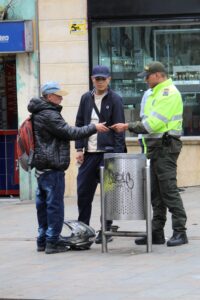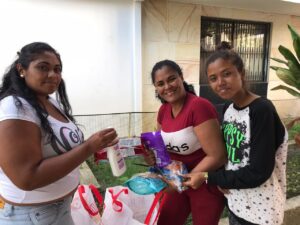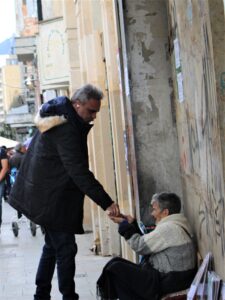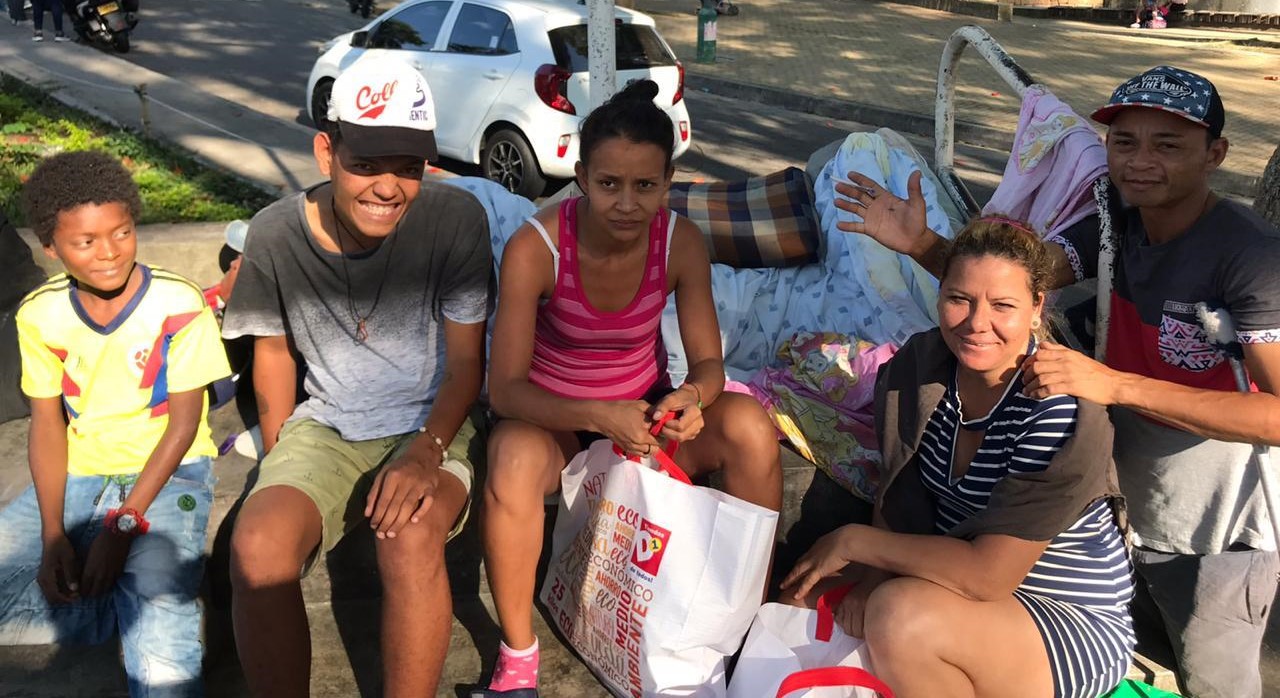Frequently Asked Questions (FAQs)
Q: Why the name “Benediction Box”?
A: Blessing in English is Bendición in Spanish, and given this program’s origins and the response from the Venezuelan refugees we gave food and personal care items to in Colombia, as well as those who have donated, it was the appropriate name. The original plan was to give away food and personal care items in boxes, but we quickly learned cardboard boxes
Q: Why do you include personal care items?
A: No matter why someone is homeless and living on the street, they need the same basic personal care items as everyone else. A toothbrush and toothpaste, bar soap, shampoo, toilet paper, wipes and feminine hygiene products are always welcome. Diapers for families with infants. These items not only provide for the personal needs of the refugees, they help them keep their sense of personal dignity.

Q: Why don’t you just give people money and let them buy what they want?
A: The reason we prefer to give food and personal care items directly to refugees is because we know from experience that it can be used for other things like cigarettes, alcohol or drugs.
We also know how difficult it can be for many refugees without the proper documents to go into the stores to buy food and personal care items. Many countries in Latin America, particularly Colombia, require an ID to make a purchase, even if paying cash.
The ID must be checked by the cashier and the ID number entered into the computerized cash register.
Venezuela’s government is both inept and corrupt, so obtaining a current national ID or passport can take weeks or months. And the only way for a Venezuelan in Colombia to do so is to return to Venezuela because on February 23, 2019, Venezuela cut off diplomatic ties with Colombia. All embassies and consulates were closed and the diplomats evacuated, so there are no diplomatic services for Venezuelans in Colombia.
There are a variety of ways for Venezuelans to obtain Colombian documents, but with almost 2 million Venezuelan refugees in Colombia, a country of about 50 million people, the system is overwhelmed. The lines are long and the Venezuelans must still have all their current documents in order to apply.
The result is many Venezuelan refugees in Colombia and other countries do not have ID that is acceptable to make purchases in the mainstream stores.
As a result, they must buy food and personal care items from street vendors and small bodegas that generally have higher prices.
Q: Well they can just turn around and sell what you give them o somebody else, right?
A: Of course they can, there are no strings attached. We’re sure it happens from time time.
Q: Forcing people to be recorded on video and tell their story to get stuff is terrible. And taking the pictures of these poor people begging in the streets is shameful! Why do you do this?

A: We never require they let us take their picture with the food and basic necessities we give them or tell us their story without their permission. They still get everything even if they decline our request.
We explain why we want to take their picture and tell us their story so people will have a better understanding of the situation they are caught up in and also to demonstrate the effectiveness of this program. Potential donors both want and need to see their contributions are going to a worthwhile cause, as well as to a program that truly makes a difference.
As for taking pictures of people in the streets, we do so discreetly and from a distance so as not to intrude or shame anyone. We want to show the world what the real situation is at this point in time.
We agree many of the pictures are shameful – the shame is that we as a society tolerate such suffering, especially when the resources are readily available to make a difference. We also think it is shameful that it is necessary to document the desperation of these refugees so people truly understand their plight, and will then be more likely to help.
Q: How do you select the people to give things to?
A: There are so many people in the streets it is often hard to pick the “right” ones, but our highest priority is families with children, especially babies and infants. We use “street smarts” to be aware of place and time, as well as the immediate surroundings so we do not create problems for BBI people or the recipients.
Typically it will be a family or small group that is in a public place, but somewhat isolated. We want our BBI people and the recipients to be safe and avoid any confrontations.
Q: Is it dangerous to go out and give people food in the streets?
A: Yes it is dangerous, as street crime has always been an issue and it is even worse now. Some of our BBI people have been the victims of street crime with cell phones and other valuables stolen, so it is always a consideration.
We ask our people to never go out alone when giving food and personal care items out on behalf of BBI. We also ask them to go out in the daytime and avoid the places that are known to be risky.
Q: Aren’t you afraid these people will hoard what you give them and it will spoil?
A: We only buy foods that are non-perishable, so spoilage is not really an issue. It is also our experience that many of the recipients share what we give them with other refugees.
The most generous people on earth are most often those with the least.
Q: Isn’t this the perfect example of how socialism is a failure?
A: There are many people that make this argument, but it is an oversimplification of the situation in Venezuela.
Venezuela was once the richest country in Latin America after World War 1, but this was primarily because the majority of their economy was based on exporting oil. Their economy was tied to the worldwide price of oil as well as how the multinational banks and corporations arranged investments and business terms. It was also impacted by other countries monetary and political policies.
When the price for oil was high, their economy was booming and the government subsidized many programs. When oil prices dropped, they government borrowed money to prop up their economy.
When oil prices failed to return to the high levels, they were over extended and the austerity measures were severe. This led the the usual political turmoil when any country faces such a crisis, and over the decades there were a number of political coups, that caused sever damage to their political institutions.
While we care about the reasons for the crisis, it doesn’t really matter to a hungry child living on the streets. Our goal is to help people that need help today. End of story.
Q: I see you give people food like rice and dry beans. How can they cook if they live on the streets?
A: Most of the refugees camp out in wooded areas with streams in little groups. They make shelters out of scrap materials, cardboard boxes and sheets of plastic. They often share their meager resources and have a few basic pots, pans and utensils to cook together over small fires.
Q: How can you give people fresh foods like milk and eggs?
A: The milk we give people is aseptic, so it does not need refrigeration and does not need preservatives. It is generally consumer very quickly when the package is opened.
Eggs are intact, meaning they are unwashed (the washing removes the cuticle, which seals and protects the egg), so they are good for several months without refrigeration.
Both aseptic packaging and unwashed eggs are very common in Latin America and many other parts of the world., especially in tropical countries or where refrigeration and electricity is expensive.

Q: Why don’t the people of Colombia help these refugees?
A: They do. and many are very generous, but Colombia is itself just coming out of a protracted armed conflict that continues to this day, although to a lesser degree. And it is still dealing with the issues of the illicit drug trade.
Even without these challenges, the sheer volume of Venezuelan refugees has stretched resources, and it is even worse now with COVID-19.
Q: What about the churches and the government? Why aren’t they doing more?
A: We don’t know for sure, but the best we can tell they are doing what they can with their resources. And the scope of the Venezuelan refugee crisis is such that the institutions are unable to keep up with the changes that are needed.
There are also many social and political forces at work.
No matter, BBI will do what we can in our own small way.

